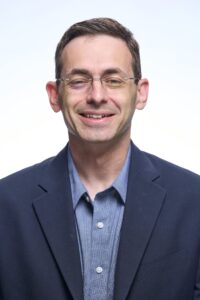Chair’s Welcome
 The Department of Mathematics is an internationally recognized research hub and a nexus for foundational, interdisciplinary research at Vanderbilt. We are also a team of passionate, dedicated, and talented instructors, serving many hundreds of undergraduate students each semester. Our mission as a department has three pillars:
The Department of Mathematics is an internationally recognized research hub and a nexus for foundational, interdisciplinary research at Vanderbilt. We are also a team of passionate, dedicated, and talented instructors, serving many hundreds of undergraduate students each semester. Our mission as a department has three pillars:
- To provide world class education to our undergraduate and graduate students, and to do this in a way that is welcoming and equitable. We want all of our students to thrive when they come to Stevenson 1. We want them to learn to think critically. We want to help equip them to see and analyze the numbers, shapes, and patterns they see in everyday life. We want them to become expert truth seekers, a skill that is more important now than ever before.
- To perform mathematical research at the highest level. We aim to take risks and tackle problems that have high rewards, both within pure mathematics and with regard to the fundamental issues of humanity. We aim to establish ourselves further as an international destination for mathematics, and to have a deep impact on the important mathematical questions of our time.
- To be ambassadors for mathematics within Vanderbilt, in the Nashville community, and beyond. Mathematics is increasingly central in our everyday lives. Our job is to convey this across disciplines and to the general public, and to inspire the next generation of mathematicians and scientists.
Our faculty boasts seven endowed Stevenson Professorships, two Dean’s Faculty Fellows, three Chancellor’s Faculty Fellows, a Centennial Professor, and a Distinguished Professor. We have four faculty who have spoken at the quadrennial International Congress of Mathematicians. We also have nine Fellows of the American Mathematical Society, two Fellows of the Society for Industrial and Applied Math, five Sloan Fellows, two NSF CAREER award winners, a Simons Fellow, a Humboldt Prize winner, and three AMS plenary speakers.
Our department is home to the Shanks Workshop and Shanks conferences, the Center for Noncommutative Geometry and Operator Algebras, and the Center for Constructive Approximation, as well as the VandyGRAF program, the Vanderbilt initiative for Gravity, Waves, and Fluids.
Included among our many on-campus collaborators are the Quaranta Lab and the Quantitative Systems Biology Center at the Vanderbilt Medical School, the Department of Teaching and Learning at Peabody College, the Department of Physics, the Machine Intelligence and Neural Technologies Lab in the Neuroscience Department, the Department of Chemistry and Biochemistry, the Department of Medicine, the Vanderbilt Institute for Infection, Immunology, and Inflammation, and the Vanderbilt-Ingram Cancer Center, among many others.
We teach in small classes – usually under 30 students – and with an emphasis on interaction and active learning. Our faculty has received a number of university wide teaching awards, such as a Dean’s Distinguished Teaching Fellowship and two Jeffrey Nordhaus Awards for Excellence in Undergraduate Teaching.
We teach an array of undergraduate courses, from Calculus, to Mathematical Finance, to Topology, to History of Mathematics. Our major has three tracks: standard, applied, and honors. We offer both a BS and an MA degree. We have an active Math Club, as well as an undergraduate seminar, a chapter of Pi Mu Epsilon, and an Actuarial Science Club.
Our graduate program is ranked 43rd by US News and World Report, up from 47th in the last rankings. Our students have gone on to academic positions at Harvard, MIT, UCLA, Oxford, the Technion, the National University of Singapore, Australia National University, Dartmouth, Johns Hopkins, UC Santa Barbara, and Oak Ridge National Labs among many others. Our students have also gone on to jobs at Google, Humana, Alibaba, MITRE Corp, Carmax, and Experian, to name a few.
Our faculty are dedicated to reaching out to the community and sharing our love for and knowledge of mathematics. We work, for example, with school children in the local Math Circle that we organize, with undergraduates in the Undergraduate Seminar, and with graduate students in the EMIT (Establishing Multimessenger astronomy Inclusive Training) program.
If you are interested in becoming involved in any of these activities at any level, please contact us. We look forward to hearing from you!
Sincerely,
Dan Margalit
Professor of Mathematics
Stevenson Chair in Mathematics
